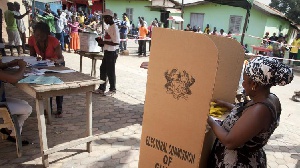Lecturer of Philosophy at the University of Cape Coast (UCC) Richard Ansah has cautioned religious leaders who make empty electoral prophecies to desist from the act in order to protect the sanctity of God.
He has also urged Ghanaians to evaluate the credibility of electoral pollsters before trusting their findings.
Over the years, many religious leaders especially those in Christianity have made prophecies about elections, making them identified with various political parties. Christians believe that prophecies from God surely come to pass but, occasionally, some of these prophecies do not materialize.
The general public, therefore, raised concerns about the sources of some of these prophecies, questioning the credibility of some Christians who claim to be prophets. Popular Nigerian prophet TB Joshua is reported to have prophesied victory for Hillary Clinton ahead of the US presidential elections yet her opponent, Donald Trump, won.
Ghanaian-based Prophet Daniel Obinim has also reportedly prophesied victory for the New Patriotic Party (NPP) but lecturer of Philosophy at UCC Mr Ansah wants Christians to be careful with prophesying.
“One will ask, did God tell you? When these prophecies do not come to pass you give people the opportunity to question the basis, source and power of whoever talks to you. You lose your credibility, even those in your own church if you are not very careful they won’t take you serious.”
The lecturer, who doubles as a pastor at Assemblies of God Church, suggests that prophets should rather pray for God’s own will to be done instead of playing with people’s emotions during elections.
Great pollsters around the world predicted win for Hillary Clinton ahead of the US presidential elections that notwithstanding the opposite happened.
Mr Ansah says although researchers may not always be right, Ghanaians may consider the credibility of pollsters before taking their findings serious.
“Sometimes the samples may not be enough to speak the mind of the masses. But if an organisation is able to get 8 out of 10 researches correct, then we could trust it.”
Ghana has less than a month to go to the polls to elect members of parliament and the president.
General News of Thursday, 17 November 2016
Source: 3news.com

















